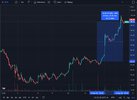JohnDe
La dolce vita
- Joined
- 11 March 2020
- Posts
- 4,614
- Reactions
- 6,835
Here's one from genius inflation predictor Hanke in 2009 telling investors "inflation will roar back with a vengeance" if the Fed doesn't stop QE and that they should "avoid being suckered into any stock market rallies" and instead "Stick with the Treasury Inflation-Protected Securities (TIPS) that I have been recommending for some time. You should also own some gold, via commodity futures or an exchangetraded fund."

Fed Up
Investors watching the recent rally may think that the Fed has saved the day, but its approach is fraught with danger.www.forbes.com
LOL
View attachment 146806
2009? That is ancient in the trading market. though, as Nostradamus followers have done, those that predict don't care about timelines.




